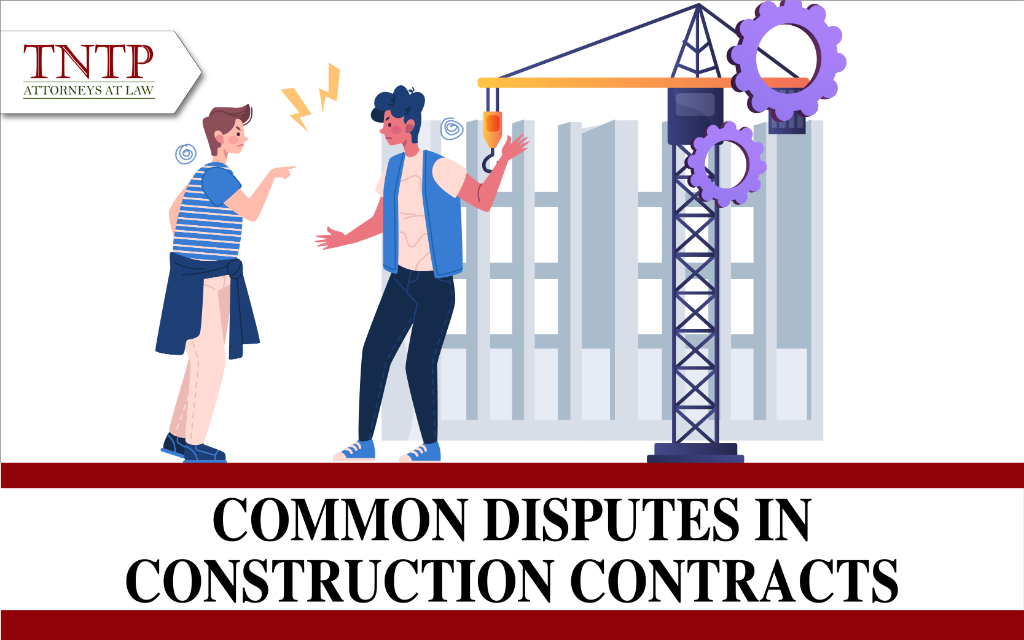The execution of a construction contract is influenced by various factors and always carries the potential for disputes. Therefore, right from the contract drafting stage, the parties need to identify possible disputes to establish the resolution methods for each case. This will help the parties to be proactive if any disputes arise. In this article, TNTP will present some common disputes in construction contracts that the contracting parties should be aware of.
1. Disputes arising from payment schedule violations under the contract
• This can be considered a typical and common dispute during the execution of a construction contract. Some reasons for such disputes may include i) Unclear payment terms and failure to anticipate issues that may arise during the contract execution (market price fluctuations); ii) Subcontractors being dependent on the payment schedule between the main contractor and the owner; iii) Incomplete payment documentation (quantity acceptance minutes, payment acceptance minutes, value-added invoices, etc.); iv) Difficulties caused by the owner, delayed payments, or inability to pay.
• In practice, when a contractor requests payment, owners may provide various reasons to refuse payment, such as:
+ The contractor’s work does not meet the required quality, has errors, or unrepaired damages;
+ The contractor is behind schedule;
+ The parties have not conducted acceptance and handover of the project.;
+ Payment documentation is invalid, such as lacking signatures, the person signing the documents not having the proper authority;
+ Additional items have not been submitted with complete documentation and approved by the owner;
+ The contractor does not carry out warranty obligations for the project;
+ The contractor provides misleading information about capacity documents to deceive the owner and engage in prohibited activities in construction operations, etc.
In the case where a contractor executes multiple projects for an owner, the owner can also argue that due to disputes in one project, they will not continue to pay for contracts related to other projects.
2. Disputes arising from failure to ensure construction progress and quality
When implementing a project, the owner’s main concerns are the construction progress and the quality of the project.
Regarding construction progress, the parties usually agree on specific timelines, and the contractor is responsible for adhering to the agreed-upon schedule in the contract. However, due to various factors such as manpower, materials, weather conditions, circumstances, etc., the contractor may delay the construction progress and affect the owner.
Regarding the quality of the project, the contractor needs to fulfil the commitments regarding materials, supplies, and design. However, in reality, some contractors may use materials or supplies that do not meet quality standards, do not conform to the agreements of the parties, or deviate from the approved designs. Contractors may also fail to comply with construction standards, technical regulations, and legal requirements regarding the use of construction materials. These factors result in inadequate quality of the project, leading to disputes between the parties.
3. Disputes arising from unilateral termination of the contract before the expiration date
When serious violations occur according to the agreements of the parties in the contract or as stipulated by law, the owner/contractor may unilaterally terminate the contract. However, in practice, many owners/contractors terminate contracts without following legal regulations and the contract. Some examples include: the contractor requesting the owner to pay for costs outside the contract, but the owner refuses, so the contractor unilaterally terminates the contract; the owner intentionally cites multiple unjustifiable reasons to claim that the contractor has violated the contract and terminates the contract based on those reasons, etc.
When one party unilaterally terminates the contract without justifiable reasons, the aggrieved party has the right to claim compensation for damages and penalties for the contract violation (if the contract includes provisions on penalties).
4. Disputes regarding compensation for damages in construction contracts
Proving the right to be compensated for damages and determining the amount of compensation resulting from the breach of a party in a construction contract is a complex task. Typically, it is difficult for the parties to reach a mutual agreement on a general compensation amount. Therefore, the parties are required to hire third parties, such as construction experts, appraisal units, evaluators, etc., to determine legal responsibilities and calculate damages.
The above is the article “Common Disputes in Construction Contracts” that TNTP provides to readers. If you have any questions or need further clarification, please contact TNTP.
Sincerely,








